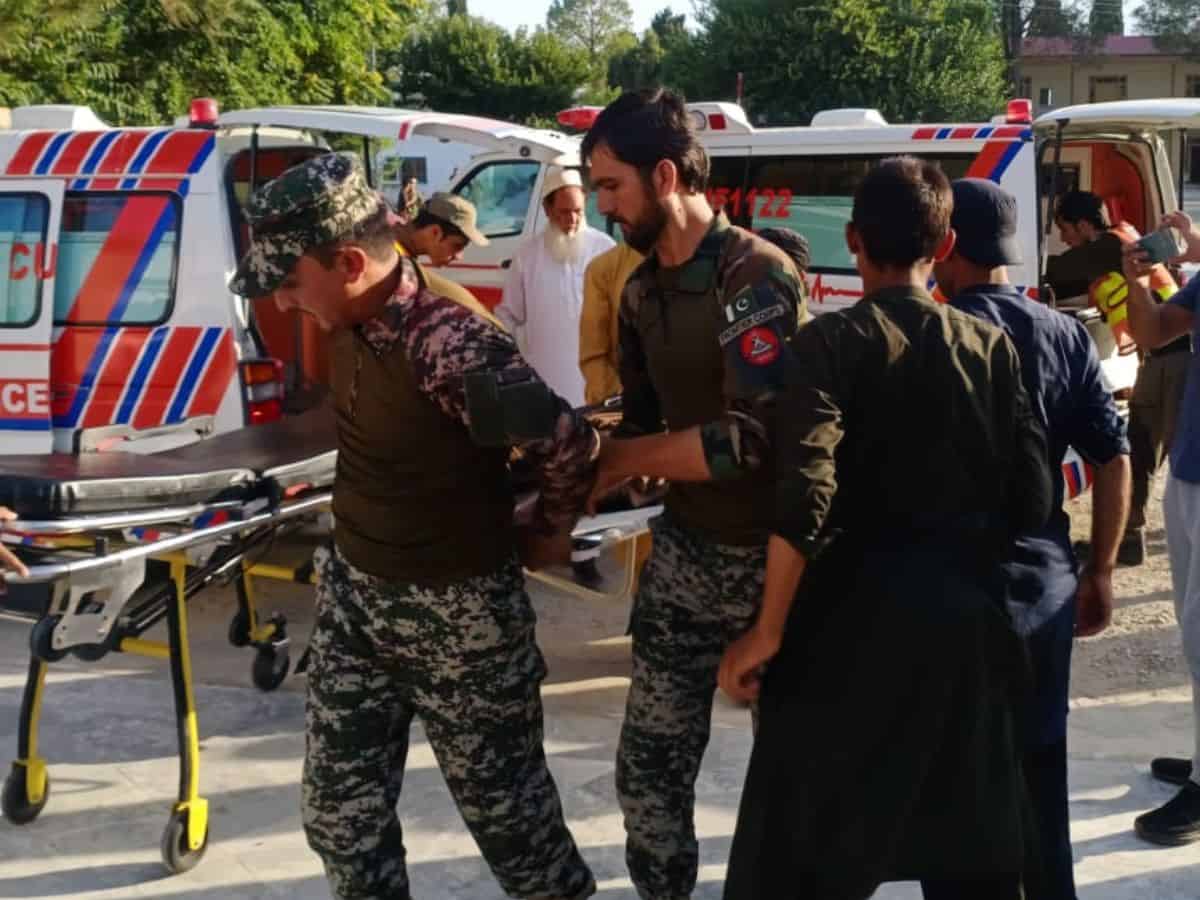
Peshawar: At least 35 people were killed and over 150 others injured on Sunday when a suicide bomber triggered a powerful blast at a hardline Islamic political party’s meeting in a restive tribal district of Pakistan’s Khyber Pakhtunkhwa province bordering Afghanistan.
The explosion took place at 4 pm at the Jamiat Ulema-e-Islam-Fazl (JUI-F) workers’ convention in Khar, the capital of Bajaur tribal district.
At least 35 people were killed and over 150 injured in the blast, police and emergency sources said.
Television footage showed panic-stricken people gathering at the site following the blast as ambulances arrived to move the injured to hospitals. Over 500 people were attending the convention when the blast occurred.
The JUI-F chief Maulana Fazlur Rehman demanded Prime Minister Shehbaz Sharif and the province’s caretaker Chief Minister Azam Khan to investigate the incident.
He also urged the party workers to reach the hospital and donate blood.
“JUI workers should remain peaceful and federal and provincial governments should provide the best treatment to the injured,” said Fazl.
Chief Minister Khan condemned the blast and sought a report from the district administration.
Khyber Pakhtunkhwa Governor Haji Ghulam Ali, who is also a central member of JUIF, confirmed the death toll.
Police said that the injured have been shifted to a nearby hospital.
The condition of the majority of the injured people was stated to be critical.
DIG police Malakand Range Nasir Mehmud Satti said the initial investigation revealed it was a suicide blast. However, evidence is being collected to determine the nature of the blast.
The area was sealed and a search operation has been initiated, he said.
No group has yet claimed responsibility for the attack.
Rescue 1122 spokesperson Bilal Faizi told the Dawn newspaper that five ambulances had reached the site.
Speaking on Geo News, JUI-F leader Hafiz Hamdullah said he was supposed to attend the convention today but could not because of some personal commitments.
“I strongly condemn the blast and want to give a message to the people behind it that this is not jihad but terrorism,” the JUI-F leader said, adding that it was an attack on humanity and Bajaur.
He demanded that the blast should be probed, recalling that this was not the first that the JUI-F had been targeted.
“This has happened before…our workers have been targeted. We raised our voice over this in the Parliament but no action was taken.”
Hamdullah also extended his condolences to grieving families and urged the provincial government to provide the best medical facilities to the injured.
Caretaker Information minister of the province Jamal Feroze Shah said an emergency was declared in hospitals of Peshawar and dir district.
Pakistan has witnessed a surge in terrorist attacks following the Afghan Taliban’s return to power in August 2021 and called upon the interim rulers to take decisive actions against terrorists including the Tehrik-e Taliban Pakistan (TTP) responsible for cross-border attacks.
In November last year, the TTP called off an indefinite ceasefire agreed with the federal government and ordered its militants to carry out attacks on Pakistan’s security forces.
On January 30, a Pakistan Taliban suicide bomber blew himself up during the afternoon prayers in a mosque in Peshawar, killing 101 people and injuring more than 200 others.
In February, heavily-armed TTP militants stormed the Karachi Police chief’s office in Pakistan’s most populous city, sparking gunfire that killed three rebels and four others, including two police constables.
The TTP was set up as an umbrella group of several militant outfits in 2007.
The outfit, which is believed to be close to Al-Qaeda, has been blamed for several deadly attacks across Pakistan, including an attack on army headquarters in 2009, assaults on military bases, and the 2008 bombing of the Marriott Hotel in Islamabad.
The TTP has also orchestrated the heinous Army Public School attack in Peshawar in 2014, in which over 130 students were killed.



